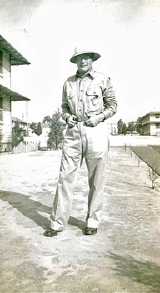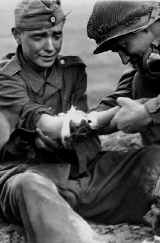
Providing care to enemy combatants who, perhaps only moments before, were trying to kill you understandably evokes ambivalent emotions among medics. Their moral duty is to save those who are injured, but it is difficult to overlook the evils these same patients have committed. On August 28, 1944, Pfc. Louis Cooperberg wrote to his younger sister Eleanor back in Brooklyn about his struggle to tend to Nazis, whose atrocities he had seen firsthand. (“Morris” is their brother, who also served in Europe; the minor punctuation and spelling errors are in the original.)
H’ya kid,
Glad to hear from you. Just a few words. We’re outside [censored] and at the moment of writing, we’re on an hour alert. We’ve been on the go for over a month with a day and a half rest in-between. We’ve run the gamut since the memorable battle at [censored] and now we’re seeing Jerry at close quarters. He’s still the same stubborn shrewd fighter, but his arrogance has left him and he now pleads that all he wants is for the war to end. Well, we’ll see to that, and soon.
The last week or so saw my outfit help close the gap at [censored], and as you know over fifty thousand prisoners were taken. Even our boys, the medics, have been picking them up. Well, the casualties have run heavy on both sides, but it’s a joy to see the Jerries run three to one, and believe me, our boys throw the book at them when they can. One memorable day we had about ninety Jerries in about ten hours. We treated every type wound you can think of and didn’t lose a patient….
One kid, an SS trooper, had a perforating wound of the frontal region of the brain. I cleaned it and treated it, and during the course of debriding, cleaned out a chunk of brain tissue that hung loose. He will be affected in that he will have no sense of inhibition. What glory for Hitler! I’ve seen chunks of shoulder missing; guts hang out of open stomachs; missing feet, legs, arms, what glory in war? Yet they fight, young and old, knowing as they admittedly know, they’ve lost the war. But Hitler demands they fight to the death—and they do.
I speak German pretty well, I speak to them. What can I say…. They have robbed and murdered and raped, and they lie on my slab, innocent like and in pain, and I give them the same care, the same treatment I give our own boys. Yet all the while, I know these same men have killed my cousins and aunts and uncles in Poland, have tortured and killed without compunction, and despise me because I am a Jew. But I treat them.
Occasionally, when I am through and Jerry blubbers out his thanks, I tell him I am a Jew. He seldom believes me. He may say, hurriedly, it matters not to him, he has never killed any Jews, but fear is on his face and I see the lie, but still I treat them. One day we had five medics and their major. They helped around with the wounded and hated to leave. I told them I was a Jew. They didn’t believe me. When finally they left for a prisoner of war cage, they actually embraced me. What could I do. One had been in Russia three years, the others were all old soldiers, they knew I was a Jew, they didn’t believe me, but embraced me.
An old fellow, his face and his bearing attesting his fear of what his propagandists told him he might expect at our hands, kept me busy reassuring him we were not savages. I hated every minute of it. An SS trooper arrogantly refused a blood transfusion because it was American blood, we forced it into him, we should have let him die. I fixed a German when gas gangrene had set in, and my friends marveled that I, a Jew, should touch him, much less clean his infection. But I can’t explain that. How can you hate one defenseless man?
Jerry cries at the little things, Jerry is maudlin till it turns your stomach, but he fights till the last bullet, then cries Comrade. I’ve given dozens of doses of blood and plasma to Jerry, I’ve splinted his breaks, I’ve held him, and calmed his fears. I know he’s a scourge for I’ve seen his handiwork. Yet, when he stands there talking to you, or lies there looking at you, you can’t project hate. I’ve seen him devastate a city and drive the populace before him, so as to deny what he himself cannot have, to others. And I’ve seen what he has left after he has taken what he has wanted, often at the point of a gun.
I’ve seen the hatred in the eyes of the French whose men and husbands have been driven like beasts to work on the farms, and factories of German masters. I’ve seen the sores and maladies and the impoverished homes of peace loving farmers, who submitted their daughters to the pleasures of the German Officers so that they might hold what is still theirs to hold.
 Not every child suffers from rickets, not every girl has been raped, not every father has been taken to Germany to work [in forced labor] for the Todt Organization, but look into a Frenchmen’s eyes and see what four years have done to him. Look down at the French civilian, the maquis, who at the age of forty-six led our own recon tank company into the woods and armed with a bazooka knocked out two tanks single handed and accounted for around a dozen Jerries before they blew his hand off. He lay on the stretcher and cried, but kid he cried from Joy. He didn’t mind losing his hand, he had waited four long years – four long years! It was worth losing a hand! What made him fight at his age? What story of a wife murdered or a daughter raped lie hidden in his breast? The Captain felt compelled to add a postscript on his tag. “This man is a hero, treat him as such”. Yet he didn’t feel himself a hero, he only wanted to kill les boches.
Not every child suffers from rickets, not every girl has been raped, not every father has been taken to Germany to work [in forced labor] for the Todt Organization, but look into a Frenchmen’s eyes and see what four years have done to him. Look down at the French civilian, the maquis, who at the age of forty-six led our own recon tank company into the woods and armed with a bazooka knocked out two tanks single handed and accounted for around a dozen Jerries before they blew his hand off. He lay on the stretcher and cried, but kid he cried from Joy. He didn’t mind losing his hand, he had waited four long years – four long years! It was worth losing a hand! What made him fight at his age? What story of a wife murdered or a daughter raped lie hidden in his breast? The Captain felt compelled to add a postscript on his tag. “This man is a hero, treat him as such”. Yet he didn’t feel himself a hero, he only wanted to kill les boches.
It’s an odd fact that we forget quickly the unpleasant things in our lives but all those people who have had contact with the Germans, will they forget?… I’ve been to French homes and French farms. I’ve talked with these people. I don’t need propaganda. Jerry is always well fed, always clean shaven, never filthy with mud and grime like our boys who live and fight in the field and come in stinking from the battlefield. Jerry takes what he can, he sleeps in the homes of the conquered, and half our prisoners are the slaves he has picked up in Russia and Poland and turned into a labor corps. It is often pitiful to see the emaciated bodies of these men as against the bloated Jerry.
How deep is their hatred? What has Jerry wanted? What has he intended? Has he tried to prove that he is better than other peoples? He isn’t for we can do everything he can, and do it better. Has he tried to rid the world of evil? The world only recognizes him as evil. Then what has he wanted? I’ll tell you what he has wanted. I’ll tell you so that you’ll know and not forget. I will tell you so you’ll know why your two brothers are fighting for their lives, and why you, at your age (seventeen! When I left I gave you a dollar. It was the most money you ever saw in your life, you were fourteen then), I want you to know, so that when you come up against the same foe, that you’re fighting so that one people suddenly turned mad have not the right to enslave the world so that they may live in luxury. I want you to know that when a child lies on the stretcher before you with a bullet in her chest and she’s bleeding to death because she’s only five and you can’t stop the bleeding, and her mother lies outside, wounded and helpless, and the grandfather loses a leg, because he refused to comply with a Jerry demand for food he didn’t have! I want you to know that your elder brother held that girl and heard her cry, and he lied to that child’s mother to calm the fear in her heart and he looked on dumbfounded as the old man lost his leg—all because he didn’t give the Nazis food he didn’t have. I want you to know that you’re a Jew and in the eyes of the German you have no right to breathe the same air as the rest of the world….
I want you to know that no matter what happens to Morris or myself, we know the true enemy, and we want you to know it, it’s the people, any people who proclaim themselves better than all other peoples, and then set out to prove it by murder and trickery and by the stupidity of those who never bothered to reason for themselves.
Lou
Louis Cooperberg survived the war in one piece (as did his brother Morris) and, after returning to the States, ran an art supply store in New Jersey. He died at the age of 57 in 1967.
Andrew Carroll’s Legacy Project (online at warletters.com) is dedicated to preserving and collecting correspondence from all of America’s wars. If you have a World War II letter you would like to share, please send a copy (not originals) to:
the Legacy Project
P.O. Box 53250, Washington, DC 20009
Or: e-mail WarLettersUS@aol.com.




